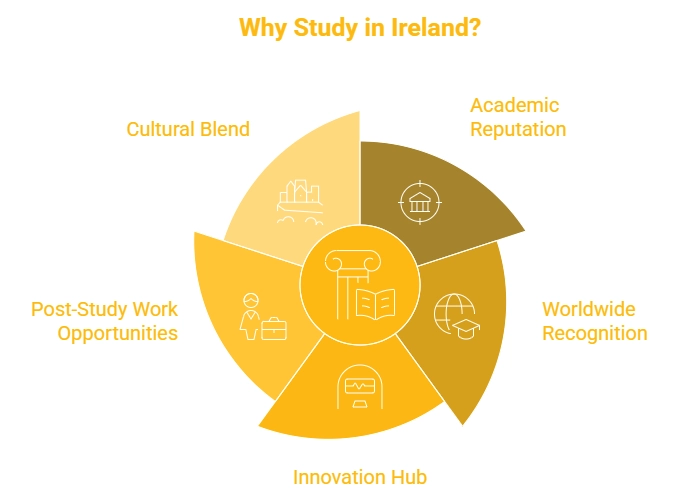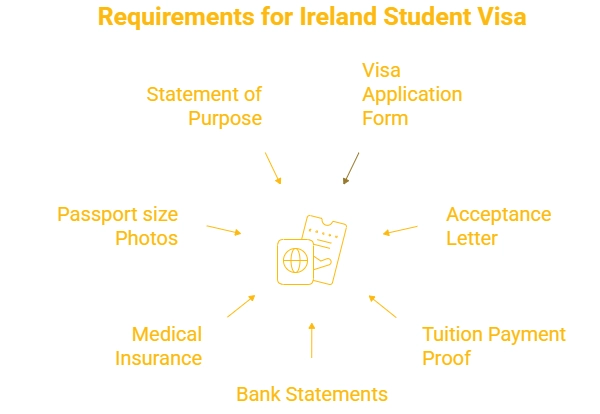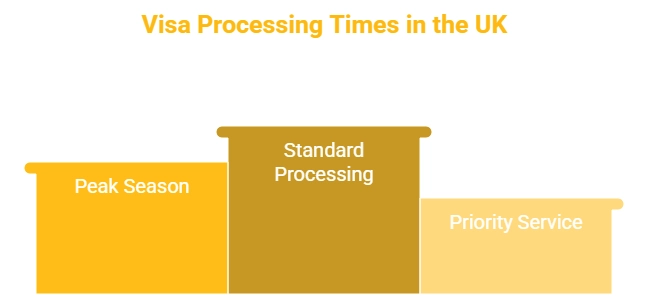Ireland has become a popular place for international students because of its good schools, lively culture, and career opportunities. It's a good option if you're thinking about studying abroad, and it's different from the US, UK, or Australia due to its welcoming atmosphere and chances to work after you graduate. Ireland has some highly ranked schools. The education focuses on new ideas, research, and real-world skills, so students are ready to work anywhere in the world when they finish school.
Here are key reasons students choose Ireland:

To be eligible for an Ireland student visa, you must meet the following eligibility criteria:

Visa processing times differ based on nationality and the time of year. For applicants in the UK, typical processing times are:

It is best to apply at least 3 months prior to your planned travel to prevent delays.
To apply for an Ireland student visa, you'll generally need these documents:
Ireland boasts several prestigious universities and colleges that attract students from across the globe:
| University Name | Location | Global Ranking |
| Trinity College Dublin | Dublin | Top 100 |
| University College Dublin | Dublin | Top 200 |
| National University of Ireland Galway | Galway | Top 300 |
| University College Cork | Cork | Top 300 |
| Dublin City University | Dublin | Top 400 |
These institutions offer a wide range of undergraduate, postgraduate, and research programs across disciplines.
In Ireland, tuition varies by program and school.
Students may also need to pay registration, book, or lab fees.
The cost of living in Ireland varies with lifestyle and location. Students typically spend the following each month:
Note that Dublin usually has higher prices than smaller cities such as Limerick and Galway.
Ireland provides various scholarships for international students to assist with their finances:
Most scholarships require a strong academic record and a convincing personal statement.
To apply for an Ireland student visa, follow these steps:
Step 1: Choose a course and educational institution.
Step 2: Receive your acceptance letter.
Step 3: Pay your tuition.
Step 4: Collect all necessary documents.
Step 5: Fill out the online visa application.
Step 6: If needed, schedule an appointment to provide your biometrics.
Step 7: Submit your application and supporting documents.
Step 8: Await the visa decision.
Step 9: Travel to Ireland and register with immigration authorities.
Ireland provides attractive work opportunities for international students after they graduate.
These factors make Ireland a great option for students wanting to start their careers in Europe.
Explore what Global Citizens have to say about Y-Axis in shaping their future
Canada Student Visa
Madhvi Varaiya is our esteemed client. S
Read More...
Canada Student Visa
Y-Axis received a great feedback from Me
Read More...
Canada Student Visa
This client provided us with great Y-Axi
Read More...
The average cost of living in Canada for international students depends on the city where you are located and the type of accommodation you choose alongside your regular expenses. Following are the average costs of living in Canada:-
| Type of Expenditure | Cost (CAD) |
| Accommodation | 2400 – 3200 |
| Books and Supplies | 500 – 1000 |
| Food | 940 |
| Other Expenses | 1540 |
Your Canada student visa can be rejected for the following common reasons if:-
1. Financial Instability: UK students applying for Canadian student visa have to prove they have sufficient financial reserves to support their stay in Canada. The Canadian embassy officials can reject your student visa application if they find that you are NOT financially strong enough to take care of your studies in Canada.
2. Academic Performance: like every other government, the Canadian government also sets eligibility for academic credits. If your academic performance is not up to the set standards of the government, it reserves the right to deny you a student visa.
3. Letter of Acceptance: If you applied for a Canadian student visa, you will get it only based on the 'letter of acceptance' you receive from your desired university. In case you do not receive the letter of acceptance from your preferred university, then your student visa will be rejected.
4. IETLS or TOEFL Score: As part of your Canadian student visa application, you must clear the minimum required marks for the English proficiency test. Your student visa application will be terminated if you don’t score the minimum marks in the IETLS and TOEFL tests which vary according to the choice of your program.
5. Inadequate Travel Documents: Your student visa will be rejected if your visa application doesn’t have a complete record of your travels or if your identity documents are unclear. To accept you into Canada for a medical condition or criminal conviction, the visa authorities reserve the right to deny you entry. Also, if you don’t provide sufficient documentation to support your travel history claims, it is up to visa officials to reject your student visa.
6. Intent to Return to Home Country: if you apply for a student visa, remember that it is a temporary visa with an expiry date, which means you have to return home once the student visa expires. Canadian visa officials, as such, will need to confirm that you will return to your home country after course completion. If they determine that you may settle down in Canada after completion of studies for whatever reason, they may straightaway reject your student visa.
7. Study Program Isn’t Consistent with Work and Qualification: Canadian authorities may well reject your student visa if the specialization you seek doesn’t match your past qualifications or work experience. You must explain why you are changing your field of specialization while studying in Canada to the immigration authorities. Your application for a student visa should also be substantiated with valid proof; otherwise, it will be rejected.
Canada is home to several globally top-ranked educational institutes that attract international students thanks to their world-class facilities and faculty. Universities in Canada are known for offering top-notch research and academic facilities supported by equally knowledgeable faculty. Universities of Canada are known for their excellent campus life and support systems designed to help international students settle down comfortably into student life.
You need to clear tests like IELTS or TOEFL exams to show your proficiency in English to study at Canadian universities, but even if you don’t clear them, universities offer many other options. Canadian universities make sure quality education, basic amenities, healthcare, and a good income are available to all, including international students looking to start their professional careers. Most Canadian universities offer programs that allow you as a student to focus on academic and scientific research, leading to breakthroughs that can benefit society.
As a holder of a Canada study permit, you must remain enrolled at a Canadian DLI, and make reasonable and timely progress to complete your program. If you fail to do so, you may be expelled from Canada. For PGWP holders, the DLI will report on your continuous enrolment and current academic status. An immigration officer is within their rights to change, cancel, or impose new conditions on your Canada study permit. These may include one or more of the following:-
a. type of course you may study
b. educational institute you may attend
c. time, and place to give compliance evidence of applicable conditions
d. work conditions on your study permit
e. time and period of your study
f. prohibition of engaging in employment
g. location of your study
h. duration of stay in Canada
i. time and place to report for medical examination or follow-up
Make sure you have all the documents to apply for a student visa and permit, and make sure you apply before you travel to Canada.
Once you receive a Canada student visa or study permit, you need to coordinate with your DLI for clarity on when to reach the institution, the date of student orientation commencement date of classes, and plan your travel to Canada accordingly.
Once you get your student visa, there are no restrictions on when you arrive in Canada. You need to make sure you have the ‘Letter of Introduction,’ which is an authorised document confirming your study permit approval. You must carry all the documents with you in person and not in checked-in luggage when arriving in Canada. These include your UK passport, letter of acceptance from your Canada DLI, proof of funds, and more.
Formalities for your entry into the Canadian border may take time, so you need to plan accordingly. Once your documents are checked, the immigration official may direct you to an immigration office to collect your Canada study permit. After getting it, be sure to check the details. Note you can’t work on/off campus till the start of your classes. Also, Canada receives the maximum number of travelers between August and September, so it would be better to avoid this period to enter Canada.
The application fee for a Canada student visa or a Canada study permit is around CAD 150, along with an additional biometric fee of CAD 85 per person.
The table below has the detailed Canada student visa costs:
| Student Visa Type | Base Application Charges in CAD |
| Study permit (including applications for extensions) | 150< |
| Biometrics fees (per person) | 85 |
| Biometrics fees for a family (2 or more applicants) total fee for families applying together | 170 |
To apply for a Canada study visa, most Designated Learning Institutions (DLIs) require a minimum IELTS score of 6.0 overall, with no band less than 5.5. However, requirements vary by institution and program. For undergraduate courses, an overall band of 6.0 is commonly accepted, while postgraduate programs may require 6.5 or higher. Immigration, Refugees and Citizenship Canada (IRCC) does not set a minimum IELTS score but expects students to meet the admission criteria of their chosen institution. Always confirm with the DLI and ensure your IELTS is from a recognized testing provider like IDP or British Council.
Yes, international students with a valid Canada study permit can work part-time during their academic session. You may work up to 20 hours per week off-campus without a separate work permit, and full-time during scheduled breaks, such as summer or winter holidays. This work right is applicable only if you’re enrolled full-time at a DLI and your program is at least six months long and leads to a degree, diploma, or certificate. Recent IRCC policy changes have also temporarily allowed eligible students to work more than 20 hours under certain conditions.
Processing times for a Canada study permit vary by country and time of year. For UK applicants, the average processing time is typically between 4 to 8 weeks. However, delays can occur due to incomplete applications, missing documents, or high seasonal volumes. Applicants using the Student Direct Stream (SDS), available to certain nationalities, may benefit from faster processing. It’s recommended to apply at least three months before your course begins to allow enough time for biometrics, medical exams (if required), and travel arrangements. You can track your application status online via the IRCC portal.
The Post-Graduation Work Permit (PGWP) is available to international students who complete a program of at least eight months in length at an eligible Designated Learning Institution (DLI) in Canada. However, not all DLIs or programs qualify. The PGWP allows graduates to work in Canada for up to three years, depending on the length of their program. To be eligible, students must have studied full-time and maintained a valid study permit throughout their course. Before enrolling, always confirm that the institution and program are PGWP-eligible on the official IRCC website to ensure future work eligibility.
Yes, international students in Canada are required to have health insurance, but coverage varies by province. Some provinces like Alberta, British Columbia, and Manitoba offer provincial health coverage to international students, while others require you to purchase private insurance. UK nationals must ensure they either enroll in a university-sponsored health plan or purchase private insurance if provincial coverage isn’t available. Health insurance must cover medical services, hospitalization, and emergency care. Having valid insurance is not only a legal requirement in most cases but also a practical necessity to avoid high medical expenses during your stay.
If an interview is required, the visa officer may ask questions to assess your eligibility, intent, and preparedness. Some of the most common questions may include:
Yes, studying in Canada can be a pathway to Permanent Residency (PR). After completing your studies, you may become eligible for a Post-Graduation Work Permit (PGWP), which allows you to gain Canadian work experience. This work experience can help you qualify for PR under Express Entry programs like the Canadian Experience Class (CEC) or Provincial Nominee Programs (PNP). Your chances improve if you meet language requirements, gain skilled work experience, and score well on the Comprehensive Ranking System (CRS). IRCC supports this pathway to help international graduates contribute to Canada’s workforce and economy.
If your Canada study visa application is refused, IRCC will provide a letter outlining the reasons, which may include lack of financial proof, unclear study intent, incomplete documents, or failure to meet eligibility criteria. You can reapply after addressing these issues or request an official GCMS notes copy for detailed insights. Before reapplying, it’s advisable to seek guidance from a regulated immigration consultant or legal expert. Reviewing your documents, refining your Statement of Purpose, and ensuring compliance with IRCC requirements can improve your chances in a reapplication.
Yes, Canada education visa holders can apply for a Post-Graduation Work Permit (PGWP) after completing their studies. The PGWP allows you to work in Canada for up to three years, depending on your program’s length. Ensure your study program and institution are eligible. Apply within 180 days of receiving your final marks. If your study permit expires before you apply, you must either restore your status or leave Canada. Once employed, your Canadian work experience can support a future PR application through Express Entry or Provincial Nominee Programs.